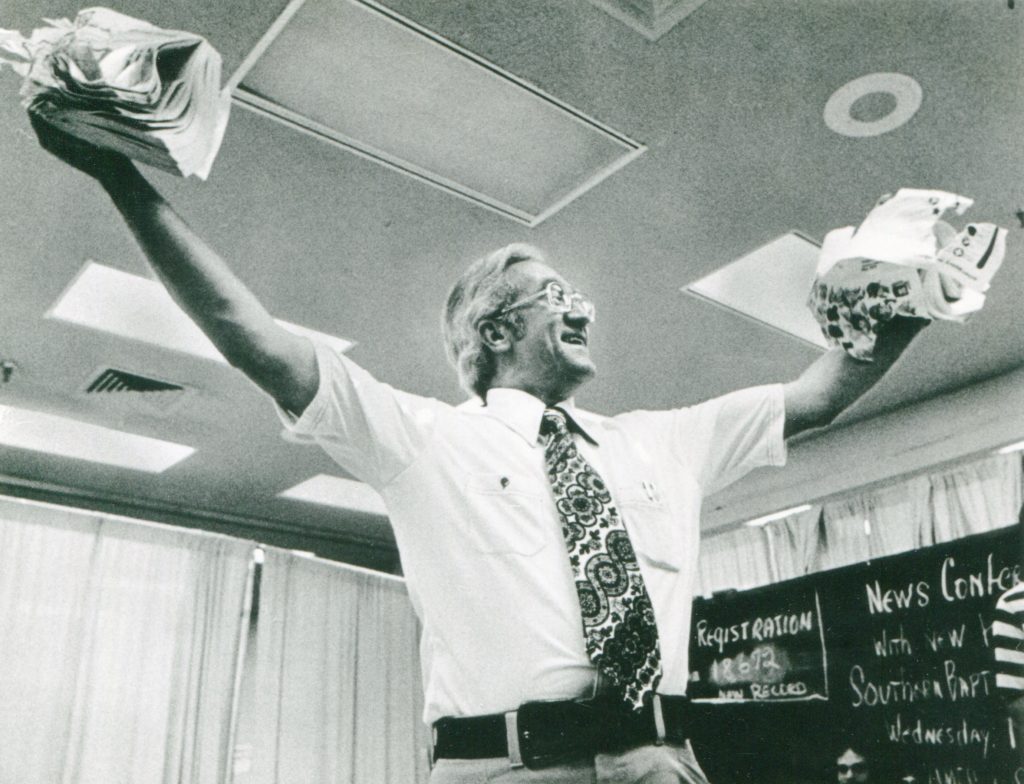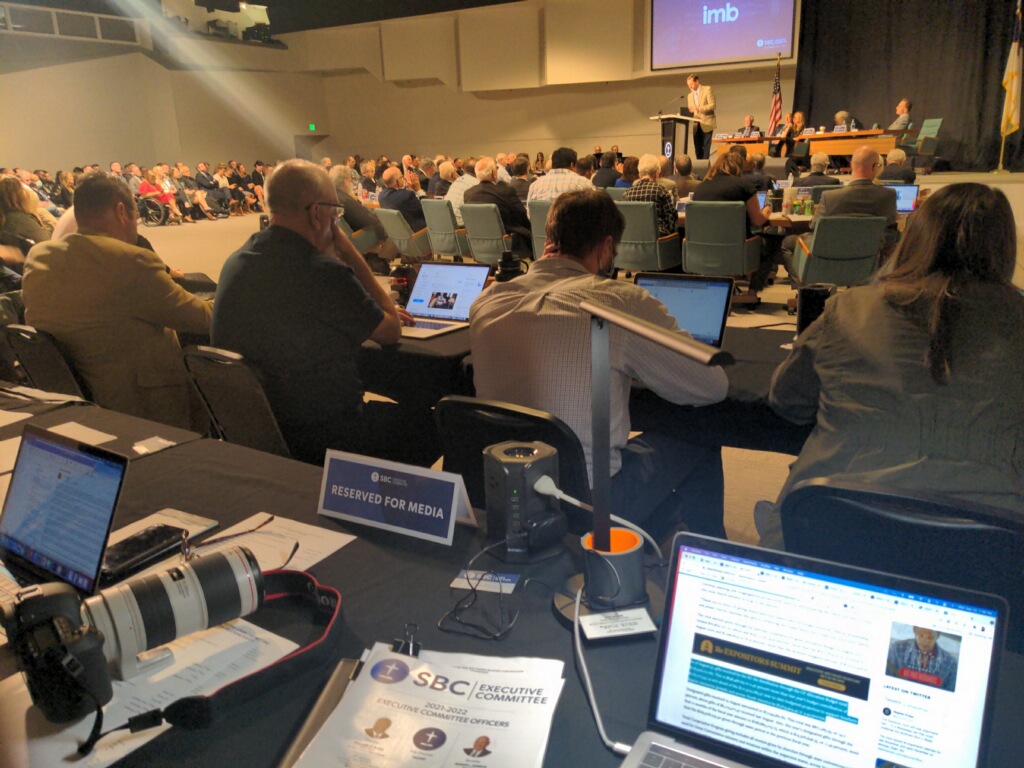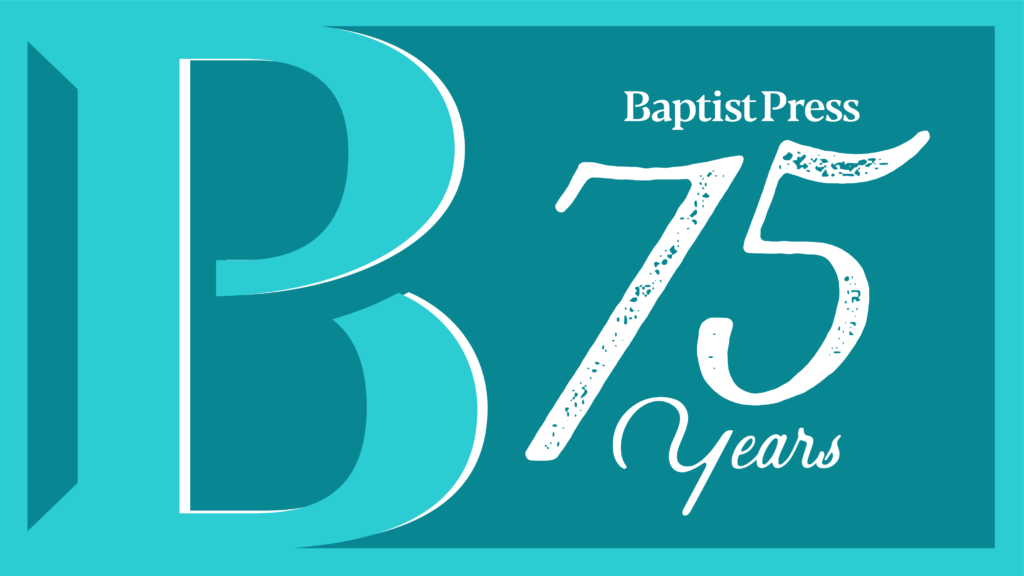
NASHVILLE (BP) – Wildfire had decimated the Northern California town of Magalia, and local pastor Doug Crowder didn’t know how his 100-member congregation could meet the swell of community needs. That’s when Baptist Press published his story.

As the December 2018 article made its way across the internet, unsolicited donations flooded in: food for 300-500 meals per day, a forklift, RVs, tools, clothes, propane and enough water to distribute 12 tons each day. BP’s reporting sparked the “worldwide flood” of provision, Crowder said two months after the fire. “We didn’t actually go looking for anything. God just keeps bringing the stuff.”
That episode illustrates the reach Baptist Press has attained in its 75 years of existence. From its beginning as a dispatch of SBC news for a handful of state Baptist paper editors, BP has evolved into a worldwide publication with influence well beyond the SBC family.
BP has moved “from a strictly church press orientation into something that constituted an alternative wire service on certain types of issues,” said Terry Mattingly, a nationally syndicated religion columnist and editor of the Get Religion blog, which analyzes media coverage of religion news. Rather than merely covering Southern Baptist news, BP has become “important religion news period.”
The concept of an SBC news service first was suggested in a 1919 SBC resolution, but it didn’t materialize until 1946, when the Baptist Sunday School Board (the precursor organization to Lifeway Christian Resources) began sending weekly news releases to state paper editors under the name Southern Baptist Press Association. The service was transferred to the Executive Committee later that year and its name shortened to Baptist Press in 1947.
An expanding focus
BP’s early decades focused on getting “SBC-wide news into all of the state papers,” wrote Duke McCall, EC chief executive at BP’s founding. That function continued approximately three decades with little controversy.

But as evangelicals’ public profile elevated in the 1970s – culminating in the election of a Southern Baptist Sunday School teacher, Jimmy Carter, as U.S. president – BP confronted a question: Would it remain a denominational publicity arm or broaden its focus to also cover news and culture from an evangelical perspective?
Baptist Press chose the latter route. That was evident in 1973 following the Supreme Court’s Roe v. Wade abortion decision when BP secured the first public comments from the case’s unnamed plaintiff, Norma McCorvey. One of McCorvey’s attorneys, Linda Coffee, was a Southern Baptist and also granted BP an interview after the Roe decision. (McCorvey’s views on abortion, like those of many Southern Baptists, changed dramatically in the years that followed. She eventually became a pro-life activist.)
By that time, major religion journalists had their eyes on BP.
“In the heyday of religion coverage by daily newspapers in the United States during the 1970s and 1980s, Baptist Press was an important and integral part of every religion editor’s awareness and sourcing,” said Louis Moore, president of the Religion Newswriters Association from 1984-86 and religion editor of the Houston Chronicle from 1976-86. “We relied on BP for accurate, reliable and honest reporting.”
Along with its heightened public profile came controversy. During the SBC’s Conservative Resurgence, conservatives accused BP of slanting its coverage toward old-guard moderate leaders. The conflict climaxed in 1990, when the Executive Committee’s conservative majority fired BP’s editor and the vice president for convention news, replacing them with more conservative journalists.

Yet as BP’s perspective shifted to the right, it persisted in the dual focus of informing Southern Baptists about denominational happenings and disseminating religion news to a broader audience.
“We began doing more stories bringing a Christian perspective to the day’s news, largely sourced by SBC and state convention leaders and thinkers as well as local pastors,” said Art Toalston, BP editor from 1992-2015, “more stories, for example, reflecting sanctity of life issues in governmental affairs and the culture; ministry in the wake of crises like 9/11 and storms like Hurricane Katrina; and persecution faced by believers under repressive regimes.”
In Washington, it was not uncommon for senators and congressmen to have BP stories on their desks when they met with staff from the Ethics & Religious Liberty Commission, said Barrett Duke, executive director of the Montana Southern Baptist Convention and former vice president of the ERLC’s Washington office.
“We made sure Baptist Press was aware of different pro-life bills we were trying to get passed or bills and policies we were trying to stop as well,” Duke said. “Because Baptist Press was willing to carry pro-life stories,” Southern Baptists had “a good understanding of the different concerns we raised with some bills.” BP deserves particular credit, he said, for rallying support behind Congress’s partial-birth abortion ban in 2003 and President George W. Bush’s 2001 ban of federal funding for research on newly created embryonic stem cell lines.
For Mattingly, BP brought a needed perspective on religious liberty cases in the court system by quoting conservative legal firms like Becket and Alliance Defending Freedom before mainstream media began using them as sources. Sometimes BP raised awareness of key religious liberty cases before the mainstream media. “This was sometimes was a place you could hear about an upcoming case for the first time,” he said.
New frontiers
Occasionally, a blockbuster BP article drew national media attention, as when Chick-fil-a chief operating officer Dan Cathy said in a 2012 BP story that the fast food chain was “guilty as charged” of supporting the traditional family. But Baptist Press found a consistently influential beat in 2006, when it began reporting polling from Lifeway Research on Christian doctrine, practice and worship. Major media outlets routinely drew polling data from BP releases.
Late pollster George Gallup once told Mattingly “he was reading Lifeway and it was influencing him” to increase polling on “blatantly church-culture related questions,” Mattingly said.
As circulation increased and mailings gave way to internet distribution, BP didn’t abandon its mission to inform Southern Baptists of key issues in the convention. That was especially true in the early 2000s when the SBC debated sole membership, a concept related to the convention’s legal relationship with its entities.
Legal discussion isn’t as exciting “as encouraging missions and evangelism,” said Morris Chapman, who served as EC president during the sole membership debate. “But at the same time, there was a need for the matter to be settled that Southern Baptists owned their institutions in the Southern Baptist Convention.” BP was a key communication outlet to help Southern Baptists “know that their interest as autonomous churches was covered in the work being done by all of our agencies.”
As with any worldwide publication, BP has generated periodic controversy. A 2010 SBC messenger motion called for BP to separate from the Executive Committee to ensure more neutral coverage of convention news. That request never materialized. More recently, some have critiqued BP’s coverage of sexual abuse among Southern Baptists.
Yet BP continues to expand its audience. In 2020, the news service saw a 26 percent increase in traffic to its website, with more than 5.8 million pageviews, according to the 2021 Executive Committee CP Ministry Report. Brandon Porter, the EC’s associate vice president for convention news, said BP seeks “to build on the effective and fair coverage of SBC news and interests” in the years ahead, “as well as reporting on current stories from a Christian worldview.”
“We want to be a part of the digital age as we reach Southern Baptists on platforms where they gather for news and information,” Porter said.
Jonathan Howe, EC vice president for communications, added that “Baptist Press has been primarily driven by the written word. As technology develops and consumer habits change, we must consider how we can best use audio and video technologies to report news for and about Southern Baptists in the future.”
At 75 years old, Southern Baptists continue to monitor Baptist Press with interest and regard it as a trusted partner in gathering information. That’s true in Montana, Duke said.
“There aren’t that many means to get what we would consider to be a concise and balanced understanding of the issues that Southern Baptists are dealing with,” he said. “But we feel like we can trust Baptist Press to help us know what Southern Baptists are thinking about and what they’re talking about.”

















